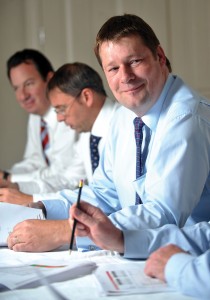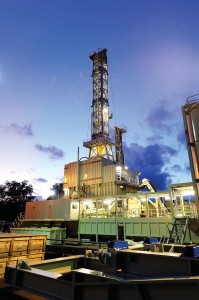Eurozone difficulties add market uncertainty
Uneven spending impacts marginal projects as emerging shale opportunities push demand for high-tech land rigs
By Jeremy Cresswell, contributing editor

Holger Temmen is CEO of KCA DEUTAG.
From your perspective, what are the main critical issues that confront the drilling sector, both on and offshore and into the foreseeable future?
There are various issues to consider: regulation – in particular when it comes to shale gas operations in Europe; people – an important and overarching issue in what is a growing marketplace; safety – the most important issue in our industry; and of course, there are new trends as a result of Macondo; current and anticipated market trends/drivers; the need for further advances in technology; and quest for greater efficiency.
In KCA DEUTAG’s case, we face all of these, both as a designer and manufacturer of drilling equipment and as an operator of drilling equipment, not just in the North Sea but elsewhere, in particular the Caspian, North Africa and Russia.
We live in remarkable times; despite the huge financial worries that particularly beset the West, the upstream oil and gas industry appears to be in good shape worldwide.
What does this means for KCA DEUTAG?
We are faced with a very opportunity-rich oilfield service environment. However, this is currently coupled with a level of uncertainty in the financial markets and especially in the light of the Eurozone’s difficulties, which for KCA DEUTAG is creating a very interesting kind of tension. Geopolitical tensions, such as the revolution in Libya, add to the mix.
While we definitely see an increase in the level of spend by our customers, it is not evenly spread. The state of financial markets will and does have an impact, especially when it comes to small or marginal projects and smaller customers that rely on third-party funding to underpin their projects.
The opportunities are such that, in our case, we are planning to add further rigs to our fleet during 2012. They will all be high-tech.
As the market heats up, will drilling contractors have access to enough skilled people to take advantage of new contract opportunities?
The first challenge we are going to see and will have to cope with as an industry and as individual companies is ensuring that we have access to a highly competent work force.
This is absolutely critical to all drilling contractors and, at KCA DEUTAG, we are building on an already very well-trained and competent work force with further training and development. We’re well-able to increase the size of our work force through training and learning from those with long experience.
I believe that the (drilling) sector as a whole has to make a significant effort to be able to cope with the expected growth. Investment is needed … effort is needed if we as an industry are to continue to develop new people.
This means too that there must be investment in training and developing local people in-country where rigs are working, because there is a general expectation by host countries that this will happen. This is a source that we collectively need to tap in any case. It is not just a requirement. We should be willing to do that. IADC might very well play a role in this.
How different is today’s market from, say, five years ago? After all, shale gas, tight oil and so forth were not on the agenda like they are now, and new regions like offshore East Africa have opened up.
Unconventional oil and gas have certainly transformed the market, especially in North America. It’s starting up in Europe and other places, too. There is the potential for unconventional across the globe, with expectations for Africa, South America and other places. The pace of change seems to be getting faster.
Look at the level of drilling activity in North America; this is driven by unconventional development. It is very much a changed market from five years ago.
Our focus at KCA DEUTAG has been to approach the European market first. We have won our first two contracts in Poland, where the level of shale gas exploration is rising. But in the Western part of Europe, particularly France, shale gas development is delayed in some instances because of the environmental debate that is going on. But there are many opportunities once they have reached a resolution, including how shale gas is regulated.
It is also important to put rigs into the European market that actually suit that market and satisfy the regulatory environment. Our modern EuroRigs are specifically designed for operations in Europe, which means they comply. They can be transported on narrow roads and are environmentally suited.

What is your view on the North Sea, given KCA DEUTAG’s strong position in this now mature market? Might the majors be re-asserting themselves given the difficulties that small companies now have raising money to explore and develop new resources?
I cannot speak for the operators, but I see additional opportunities coming up in the UK and Norwegian sectors. We see clear indications that there is more work to be won.
But we should not forget that this is a mature market and there will be further changes among operators. Some companies like Apache will continue to acquire mature assets. I expect the North Sea market in the UK to continue to be interesting and offer opportunities.
What are your current views regarding improving safety on rigs, especially in the light of Macondo?
We will see absolutely the highest level of focus on safety right across the industry. This is going to be the most importance license to operate … to be able to demonstrate that you can operate safely and effectively.
A particular change we are expecting to see is a drive toward more process in safety.
In recent years the industry has achieved extremely good results and improvements through strong focus on personal and behavioral safety. By doing that, we have as a sector achieved significantly improved performance.
But, as a consequence of Macondo, we will now see more emphasis on process safety; to look into the principles of the job we perform. Besides the behavioral safety – “where do I put my fingers” stuff – there is a need for drilling contractors to review and go through the entire process of delivering a well and ensuring that is achieved safely.
For us as a drilling contractor, it means a further push toward mechanized and automated rigs and making the whole process of drilling safer.
We have just held a meeting of all our country managers and had the benefit of Peter Sharpe, executive VP of Shell International, presenting to us his views on process safety. It was great to listen to his inspirational words on how he sees the development of process safety to achieve a breakthrough in safety performance improvement across the industry. KCA DEUTAG is determined to play a leading role in this.
And the impact of the European Commission’s plans to impose a pan-EU offshore HSE regime?
I would see the main developments in safety going forward to be driven by the major oil companies – Shell, BP and so on. They are setting the pace in this regard. I cannot say at this stage what the additional impact that the EU through Brussels will have on safety offshore Europe.
A number of technological advances in recent years have resulted in greater productivity, enhanced operational efficiency and improved safety; so where to next?
A technological development that we consider to be of growing importance is to design drilling equipment matched to different classes of well and regional/regulatory/environmental challenge.
In the past, the tendency onshore was toward the “one size fits all” approach – a drilling rig was expected to do most things. But what is becoming clear now is that tailoring rigs to particular operating conditions is of growing importance. For example, a desert rig needs to be capable of rapid redeployment between multiple wells. Such wells tend to be shallow, and moving time tends to become the critical issue.
In the Arctic, it’s a different ball game. There, one generally works from super-clusters so you don’t have to move rigs from location to location. That demands equipment of a different type.
On top of that, as the industry moves into increasingly challenging areas, such as the northern and eastern sectors of Siberia where climate conditions are extreme, it is vital to have equipment that is capable of working reliably 365 days a year, even when it’s -50°C and there’s is a high wind loading factor to take account of.
As for Europe, the emphasis will increasingly be toward automation and mechanization and process optimization. For example, in drilling for shale gas, it will become increasingly necessary to take such an approach.
And offshore?
The same pressures apply to MODUs, but there’s a long way to go before you could have a rig that is wholly automated, without any people involved. I can’t see that happening, although the move toward increasingly eliminating the human being from the drill floor will continue. We can see that creeping increasingly into land rigs too, at least in specific situations. In short, this is about designing, building and operating rigs that are optimized to different conditions.

wish to locate a Geologist Sub Contractor KCADEUTAG
Engr Dave Richard Berger is he still on contract with the company
have you located Mr. Berger?